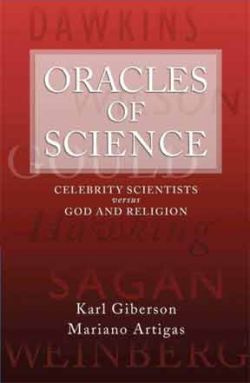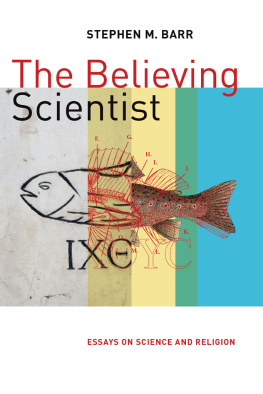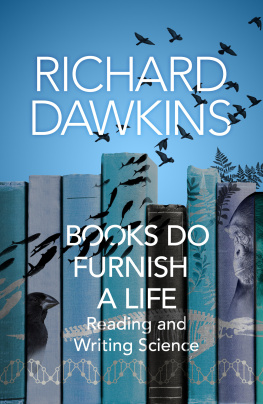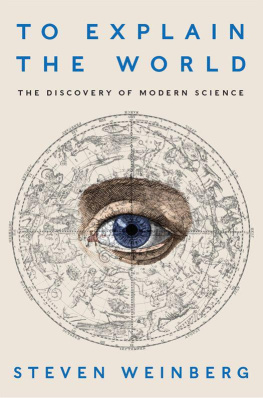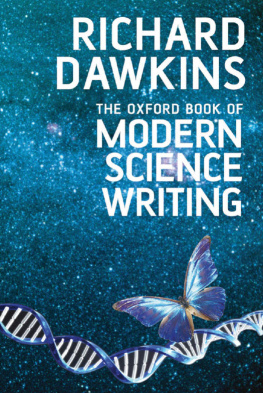Oracles of Science
Celebrity Scientists versus God andReligion
KARL GIBERSON and MARIANO ARTIGAS

2007
Acknowledgments
Thewriting of this book was an exercise in collaboration: two authors, on two continents,with two first languages, with different backgrounds in both religion andscience. But thanks to e-mail, the universality of Microsoft Word, and thevalue Europeans place on multilingualism, we could have been next door to eachother.
All such writing projects owe their genesis,development, and completion to a host of contributors. We would like to thankCynthia Read, executive editor at Oxford University Press, for encouraging usto write the book and working enthusiastically to streamline its publication byOxford. We are both delighted that such a fine press is bringing our book tomarket. The title for the book was an idea of David Gallagher, a good friendand philosopher, who also helped us conceptualize this project.
We also thank our research assistant,Kelsey Towle, who cheerfully performed countless invisible tasks that helpedthe project move quite rapidly to completion: ordering books, tracking downdetails, getting footnotes in order, and carefully readingand correctingeverything we wrote. Christi Stanforth, our copyeditor, improved our prose inhundreds of places with her careful attention to our text.
We especially thank The John TempletonFoundation for providing financial support for this project. The University ofNavarra in Pamplona, Spain, and Eastern Nazarene College in Quincy,Massachusetts, have encouraged us in our careers. And thanks to our manycolleagues at those two institutions for stimulating us to think hard about theissues tackled in this book.
The Canadian coauthor of this work wouldalso like to thank his wife, Myrna, for her loving support and encouragementthroughout.
We make special mention of the outstandingscholar Carlos Perez, professor of physics at the University of Navarra andfounder and president of the nonlinear physics group at the Royal SpanishSociety of Physics. Perez played an important role in the genesis of the bookand started this project as our coauthor; he died tragically at the young ageof fifty-two in a mountain-climbing accident.
Finally, as the familiar refrain goes, anyremaining errors of fact, confused interpretations, violations of the Englishlanguage, or other problems are ours and ours alone.
Contents
Introduction
Oracles of Science
Somewherebillions of miles from earth a spacecraft, ancient by all relevant standards,hurtles through space, an insignificant speck in a vast, empty, and some wouldsay hostile cosmos. Although there is little chance that it will be noticed byalien life-forms, it nevertheless contains a message from the human race towhatever aliens find it, just in case. The messageboth its content and theproposal to send itwas largely the work of Carl Sagan, a physicist who servedbriefly in the role of humanity's ambassador to the rest of the universe. Saganwas a dedicated, articulate, and tireless enthusiast for science; he spent hislife looking through its lenses at all of human experience and subjectingwhatever did not measure up, like religion, to withering criticism. Hisenthusiastic promotion of science turned him into a standard-bearer for thesecular humanists as they pressed their case for science against religion.
Back on earth, in England, one of ourspecies' most remarkable and productive minds resides in the tragicallywithered body of Stephen Hawking, the best-known physicist on the planet andone of the scientific community's rare celebrities. Hawking is a cosmologistwho, in a runaway best-seller, sent a message to the worldin fortylanguagesthat, at least at face value, implied that their universe had nobeginning and there was, thus, nothing for God to do.
Hawking's fellow Brit, zoologist RichardDawkins, celebrates that Darwinian evolution provides the freedom todisbelieve, to reject God, to be an "intellectually fulfilledatheist." Dawkins, whose outstanding popular science books and prestigiousOxford chair have given him a bully pulpit from which to preach, makes full useof the spotlight upon him, aggressively assaulting pseudoscience and superstitionand promoting science as the ultimate arbiter of all truth. Dawkins, one of theleading public intellectuals of our time, is especially hostile to religion,regarding it as the most dangerous of the many delusions to which humans aresusceptible.
Across the ocean, in the New World, a trioof American scientists champion similar causes. Nobel laureate Steven Weinberg,one of the greatest particle physicists of the twentieth century, assured hisreaders that the universe was "pointless" in his classic The First Three Minutes, still selling briskly a quarter century after its initial publication. We lookin vain, says Weinberg, for a purpose for human existence or anything else andmust console ourselves with the knowledge that science can lift the humanexperience above its natural level of "farce" and give it the"grace of tragedy."
At Harvard University, the prolific StephenJay Gould seconded Weinberg's pessimistic view of human origins. Gould wrote aseries of outstanding books on evolution, several of which argued eloquentlythat human evolution must be understood as a random and purposeless process andit is simply our hubris that leads us to impute some kind of meaning to naturalhistory. Play the tape of life again, he says at the end of Wonderful Life, andhistory will be different. Humans will not be here. We are the product of arandom, purposeless process that would never return to the same present ifrestarted at the beginning. Let us not think, for one minute, that we arespecial.
Also at Harvard University, Edward O.Wilson has won two Pulitzer Prizes for his eloquent and compelling books aboutthe ants and about the genetic basis for behaviors of everything from ants tohuman beings. Genes, he tells us, define human nature and profoundly shape allaspects of behavior, including our all-too-natural tendency to be religious. Helooks ahead to a day when this new science of evolutionary psychology willsuccessfully explain away religion. In fact, he speculates with gusto about aday when all of human experience will be explicable in terms of the laws ofphysics.
Carl Sagan, Richard Dawkins, StephenHawking, Stephen Jay Gould, Steven Weinberg, and Edward O. Wilson are alllarger-than-life scientific figures. They have impeccable scientific pedigrees,but it is their unusual gift for communication that has given them a platformfor speaking to millions outside the scientific community, rather than the tinyaudiences of specialists to whom their colleagues speak. Their popular sciencebooks become best-sellers and, in the case of Sagan and Gould, continue to sellbriskly years after they have passed away. Television shows bring their ideasto even broader audiences. Six hundred million viewers worldwide watched Saganbring his view of science to life in the thirteen-part series Cosmos, produced in1980 but still available and recently enhanced with new footage and updatesfrom Sagan's widow, Ann Druyan.
Theseare the Oracles of Science. Like the traditional oracles of classical Greece,Shakespeare, and even the hit movies about the Matrix, they tell us what weneed to know. Are we alone in the universe? Where did we come from? Did theuniverse have a beginning? Is there a point to our existence? Are we theproducts of random chance? Where do we find answers to deep and importantquestions? We are a culture that looks to science because that is where weexpect to find our answers. We cannot, however, find these answers ourselves,for only a specialist can navigate the complex terrain that is modern science.We need guidesOraclesto show us the way.
Next page
